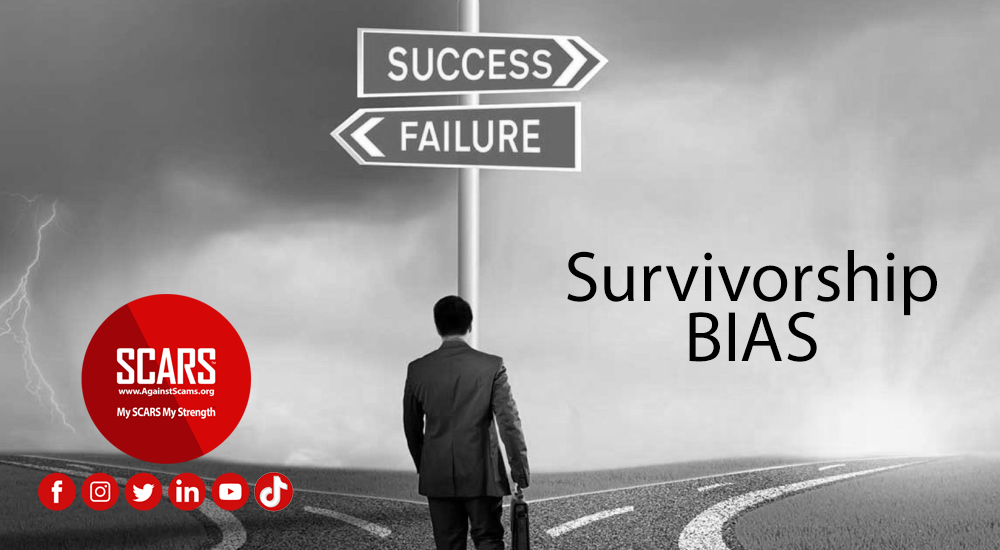Survivorship Bias & Romance Scams – Psychology of Scams
If you survive an experience, the fact that you survive gives you false information about reality!
How ‘Survivorship Bias’ Can Cause You To Make Mistakes
Effective decision making requires a detailed look at all data – all information! But it’s very possible you might not be seeing the whole picture on purpose!
The desire to learn from the successful is a natural instinct, but this can backfire if we don’t take into account ‘survivorship bias.’
In simple terms, this comes about when we select only the ‘survivors’ – those that outperformed the rest, whether people, machines or companies – and come to conclusions based on their attributes, without looking more broadly at the whole dataset, including those with similar characteristics that failed to perform as well.
In the case of scams, it comes from listening too much to the survivors – who many times think they know all the answers, but in fact, are not experts.
The most famous example of survivorship bias dates back to World War Two. At the time, the American military asked mathematician Abraham Wald to study how best to protect airplanes from being shot down. The military knew improved armor would help, but couldn’t protect the whole plane or would be too heavy to fly well. Initially, their plan had been to examine the planes returning from combat, to see where they were hit the worst – the wings, around the tail gunner and down the center of the body – and then reinforce those areas.
But Wald realised they had fallen prey to survivorship bias, because their analysis was missing a valuable part of the picture: the planes that were hit but that hadn’t made it back. As a result, the military were planning to armor precisely the wrong parts of the planes. The bullet holes they were looking at actually indicated the areas a plane could be hit and keep flying – exactly the areas that didn’t need reinforcing.
This applies to scam avoidance and to recovery as well!
Once you are familiar with the idea of survivorship bias, you can start spotting it everywhere.
For example, a gym might feature those who’ve toned up quickly as a result of going to their facilities but, of course, what they never show is those who signed up but achieved no more than a depleted bank account.
Another example is when a company is tempted to copy the strategy of a rival. A policy of “radical transparency” that includes blunt public feedback may work for Netflix and firing the 10% most “under-performing” staff might have been effective at General Electric. But before adopting any of these policies where you work, you should be wary of only looking at their use in successful companies.
Scam victims frequently turn to the outspoken survivor victims as examples of how to avoid scams and how to thrive afterward. But the victims who did not survive or committed suicide never have their voices heard, except by organizations like SCARS.
Scientists would seem to be a group of people that wouldn’t fall prey to the distortions of survivorship bias. But for years, many scientific journals have been criticized for a ‘publication bias’ toward studies that are “more” interesting or that show significant results (that tended to confirm what they already believed – that is called Confirmation Bias). Although it’s understandable that journal editors don’t want to use limited space to feature experiments where little happens, the result is an incomplete picture of the evidence.
This Exact Same Thing Happens In The World Of Scams
It is why amateur anti-scam groups can be so dangerous. They neither understand the big-picture nor try to overcome their inherent bias.
Everything is based upon their own experience, without solid research into all of the ways these experiences harm or may help recovery, or even what recovery is. They claim to know everything but could not even tell you the basics about trauma – but victims follow them because they want to believe in the easy path!
SURVIVORSHIP BIAS IS WHEN YOU CONCENTRATE ON THE SUCCESSES AND FORGET ABOUT THE LOSSES.
The problem is, the world is full of successful people trying to sell us their own particular stories of triumph (this includes scam victims). And we tend to gravitate to them. After all, no one wants to sit in a theatre and listen to the actor that failed, or watch a Ted Talk about the entrepreneur who couldn’t fund her start-up. No one wants HARD – we all want EASY. But easy is usually a path to failure.
Leading By Example?
A subtler source of survivorship bias appears when society turns its attention to successful individuals. Often our attention is drawn to people who achieve success ‘despite the odds’ or ‘take big risks’.
For example, a number of today’s billionaires – Bill Gates and Mark Zuckerberg, for example – achieved their success despite never going to or finishing university, a fact that has attracted considerable media attention. The New York Times reported on a “groundswell” of young people choosing not to go to university (the article featured a cartoon with the words, “College is for suckers”) and, in 2011, Silicon Valley entrepreneur Peter Theil launched an ongoing programme that awards $100,000 to young entrepreneurs who want to drop out of school.
Easy Is Understandable
It’s easy to understand the appeal of stories like this. Hearing about successful people defy the odds is encouraging: if they achieved riches without going to a university, it’s easy to believe, then surely I can, too. But this is another example of survivorship bias. If you look at all those who don’t go to college, rather than just the successful examples, a very different picture emerges. In 2018, the employment rate for graduates in the UK was 88% and 72% for non-graduates. The median annual salary for a graduate was £34,000 ($43,000), and £24,000 ($30,000) for a non-graduate. Although attending a university isn’t necessary to be rich, looking at the whole picture rather than just the survivors makes clear that it does help.
Similarly, people tend to believe anyone that appears authoritative. Anti-scammers that tell a good story that plays to victims’ fears or anger are believed over those that tell them reality. This is a major reason why so few scam victims actually recover – less than 35%.
In fact, the danger in basing your understanding of the world on those who have ‘beaten the odds’ or have succeeded becomes clear if you carefully consider the logic of those phrases. Such people must be unrepresentative of the bigger picture, and thus one should be cautious of emulating them. After all, if everyone was succeeding by taking a big risk or following the charismatic leader or false profit, it can’t have been that big a risk or that hard, nor the odds that daunting. This is completely untrue, yet people believe what is easy or already fits their internal bias.
Social Media & Survivorship Bias
The most common modern-day example of survivorship bias can be found on social media and it’s the ubiquitous selfie.
When you see all those perfect pictures, the pouting lips, the long eyelashes, the chiseled cheekbones, and you think to yourself – how can someone be that gorgeous? The answer is, they’re not. They have taken hundreds of pictures, picked the best one, and then highly edited it to make themselves look perfect. You do not ever see the ones where they look normal.
It Is Tempting
We are tempted to think success in anything is due to particular characteristics that can be emulated. Just remember that sometimes, success can also come down to luck, but more often to hard work!
Do the work, put in the hours, listen to real experts, and you too can succeed! That includes recovering from a scam!
Don’T Let Cognitive Biases Distort Your Thinking
Survivorship bias can skew your thinking in many ways. It can make you ignore failures, which are just as important to truly understand the successes. It can also fool you into thinking success is easy to achieve. Moreover, it leads you to believe that the few represent the many, when in fact, we should be looking at the majority that fails more often than succeed.
Remember, to get the balanced picture, don’t forget about the failures. We never do!
Here is a BBC video that explores Survivor Bias!
TAGS: SCARS, Information About Scams, Anti-Scam, Scams, Scammers, Fraudsters, Cybercrime, Crybercriminals, Romance Scams, Scam Victims, Online Fraud, Online Crime Is Real Crime, Scam Avoidance, Survivors’ Bias, Psychology of Scams
SCARS™ Team
Society of Citizens Against Relationship Scams Inc.
A Worldwide Crime Victims Assistance Nonprofit Organization
Visit: www.AgainstScams.org
Contact Us: Contact@AgainstScams.org
PLEASE SHARE OUR ARTICLES WITH YOUR FRIENDS & FAMILY
HELP OTHERS STAY SAFE ONLINE – YOUR KNOWLEDGE CAN MAKE THE DIFFERENCE!











Leave A Comment